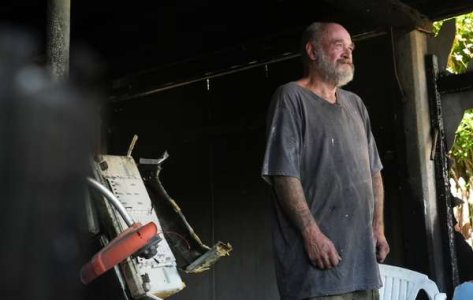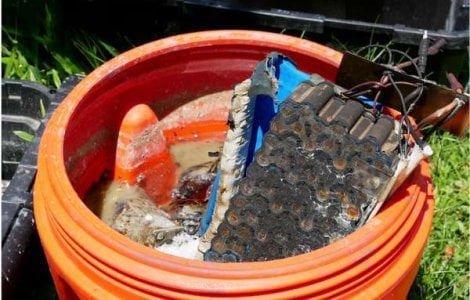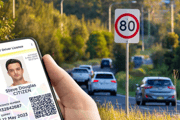Why charging your e-scooter at home could cost you everything
By
Maan
- Replies 22
When it comes to home safety, many of us overlook the hidden dangers that can be lurking in our own spaces.
What starts as a simple, everyday task can quickly escalate into a life-altering disaster. It’s important to stay informed and aware of the risks that could impact your family and home.
Here’s what you need to know.
It was a normal evening for Darryl Hurst. He had taken two sleeping pills, finished his tea, and was heading to bed when the piercing screams of his daughter-in-law shattered the quiet.
Suddenly, a fire had ignited in the garage, where an electric scooter was charging, rapidly spreading and consuming his two-storey South Townsville home.
'By the time I got from my room to the stairwell, there was already fire coming through into the stairwell and the verandah,' Hurst said.
'Within five minutes the house was gone. It's one of the worst fires I've ever seen — if I would've laid down, I wouldn't have woken up, I wouldn't have made it out.'
Hurst, who had lived in the house for 37 years, had been unable to afford insurance. Now, a disability pensioner, he faced homelessness, spending the last three months living in a camper trailer parked in his own backyard.
He expressed his regret over not knowing the dangers associated with e-scooter batteries before it was too late.
'They're a ticking time bomb,' he said through tears. 'It has absolutely shattered me.'
Alexia Tanner, his daughter-in-law, had been sleeping just a metre away from where the fire started
'The firies said we should go buy a lottery ticket because we're very lucky to be alive,' Tanner remarked.
Lithium-ion batteries, used in items ranging from smartphones to power tools, have been linked to over 500 fires across Queensland since July 2021, according to the Queensland Fire Department (QFD).
This includes nearly 240 residential fires. While these batteries pose a low risk when bought from reliable retailers and used as intended, second-hand or damaged units, particularly those charged with aftermarket chargers, can pose significant dangers.
QFD Superintendent Mark Halverson warned of the increasing challenge lithium-ion batteries present to firefighters. 'Not only can there be a rapid increase in the intensity of the fire, but they're also very prone to reignition,' he explained.
He noted that a fire could reignite hours or even days after being extinguished due to the heat retained within the battery pack.
In a tragic incident in 2022, an explosion and fire that claimed a young man’s life were linked to an incompatible e-scooter charger.
Additionally, in April of the same year, a Brisbane unit fire left two people critically injured after an e-scooter charging accident.
Superintendent Halverson strongly advised the public to monitor devices while they charged.
'Don't put your charger on overnight while you're sleeping,' he warned.
He also suggested charging scooters outside and in a cool, dry location, and urged consumers to regularly inspect their devices for any damage.
'An e-scooter or a bike, if it's involved in some sort of a collision or crash, needs to be checked to ensure that there hasn't been damage to the battery pack or the cells that are contained inside that battery pack,' Superintendent Halverson said.
The aftermath of Hurst’s fire has left a burned-out home, soon to be demolished, and a message he hopes will resonate with others
'Please don't charge the batteries in your house; charge them out the back out in the yard,' Hurst pleaded. 'We still had batteries that were bubbling a month and a half later.'
In a previous story, the fire service issued an urgent warning about the dangers of charging lithium-ion batteries inside homes. If you haven't read it yet, make sure to check out this article for critical advice that could keep your home and family safe.

Have you taken the necessary precautions in your home to prevent such accidents? Share your thoughts or any safety tips you use in the comments below.
What starts as a simple, everyday task can quickly escalate into a life-altering disaster. It’s important to stay informed and aware of the risks that could impact your family and home.
Here’s what you need to know.
It was a normal evening for Darryl Hurst. He had taken two sleeping pills, finished his tea, and was heading to bed when the piercing screams of his daughter-in-law shattered the quiet.
Suddenly, a fire had ignited in the garage, where an electric scooter was charging, rapidly spreading and consuming his two-storey South Townsville home.
'By the time I got from my room to the stairwell, there was already fire coming through into the stairwell and the verandah,' Hurst said.
'Within five minutes the house was gone. It's one of the worst fires I've ever seen — if I would've laid down, I wouldn't have woken up, I wouldn't have made it out.'
Hurst, who had lived in the house for 37 years, had been unable to afford insurance. Now, a disability pensioner, he faced homelessness, spending the last three months living in a camper trailer parked in his own backyard.
He expressed his regret over not knowing the dangers associated with e-scooter batteries before it was too late.
'They're a ticking time bomb,' he said through tears. 'It has absolutely shattered me.'
Alexia Tanner, his daughter-in-law, had been sleeping just a metre away from where the fire started
'The firies said we should go buy a lottery ticket because we're very lucky to be alive,' Tanner remarked.
Lithium-ion batteries, used in items ranging from smartphones to power tools, have been linked to over 500 fires across Queensland since July 2021, according to the Queensland Fire Department (QFD).
This includes nearly 240 residential fires. While these batteries pose a low risk when bought from reliable retailers and used as intended, second-hand or damaged units, particularly those charged with aftermarket chargers, can pose significant dangers.
QFD Superintendent Mark Halverson warned of the increasing challenge lithium-ion batteries present to firefighters. 'Not only can there be a rapid increase in the intensity of the fire, but they're also very prone to reignition,' he explained.
He noted that a fire could reignite hours or even days after being extinguished due to the heat retained within the battery pack.
In a tragic incident in 2022, an explosion and fire that claimed a young man’s life were linked to an incompatible e-scooter charger.
Additionally, in April of the same year, a Brisbane unit fire left two people critically injured after an e-scooter charging accident.
Superintendent Halverson strongly advised the public to monitor devices while they charged.
'Don't put your charger on overnight while you're sleeping,' he warned.
He also suggested charging scooters outside and in a cool, dry location, and urged consumers to regularly inspect their devices for any damage.
'An e-scooter or a bike, if it's involved in some sort of a collision or crash, needs to be checked to ensure that there hasn't been damage to the battery pack or the cells that are contained inside that battery pack,' Superintendent Halverson said.
The aftermath of Hurst’s fire has left a burned-out home, soon to be demolished, and a message he hopes will resonate with others
'Please don't charge the batteries in your house; charge them out the back out in the yard,' Hurst pleaded. 'We still had batteries that were bubbling a month and a half later.'
In a previous story, the fire service issued an urgent warning about the dangers of charging lithium-ion batteries inside homes. If you haven't read it yet, make sure to check out this article for critical advice that could keep your home and family safe.
Key Takeaways
- A fire in a home started when an electric scooter's battery, left charging in the garage, sparked a blaze that destroyed the house.
- The homeowner, who could not afford insurance, has been living in a camper trailer in the backyard after losing his home and belongings.
- Lithium-ion batteries, common in many devices, have been linked to numerous fires and pose a serious risk if damaged or charged improperly.
- Experts advise keeping charging devices supervised, using them in well-ventilated areas, and regularly checking for signs of damage to prevent fires.
Have you taken the necessary precautions in your home to prevent such accidents? Share your thoughts or any safety tips you use in the comments below.









